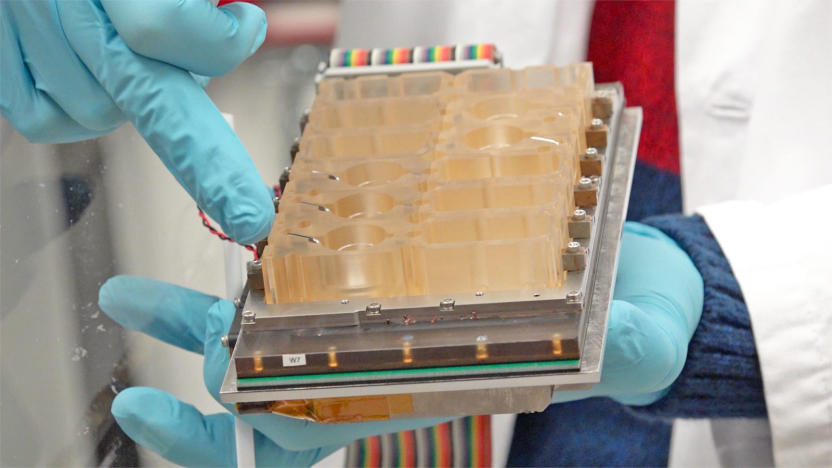ReproductiveHealth
Latest

Stem cell therapy makes sterile mice fertile again
Researchers at Shanghai's Jiao Tong University have conducted an experiment involving stem cells and sterile mice. Germline stem cells -- the building blocks of an egg -- were taken from a young mouse and implanted into the ovary of a mouse that had been sterilized. Five to eight weeks later, and this implanted mouse was mated with a healthy to see if pregnancy would occur. The experiment, which tested eight such mice, found that six of the group managed to fall pregnant and deliver healthy offspring.

Scientists recreate the female menstrual cycle on a chip
Scientists don't understand as much as they'd like about the female reproductive system, both due to their historical exclusion from studies and the challenge in replicating the complexities of that anatomy. At last, however, there's progress. Researchers have developed an organ on a chip that models a woman's entire reproductive system, including menstruation and hormone-induced responses. It clearly doesn't look like the real thing (see above), but numerous key behaviors are present.

Gates Foundation: Empowering women is key to fighting poverty
In 2006, Berkshire Hathaway CEO Warren Buffet donated $31 billion in company stock to the Bill and Melinda Gates Foundation. As a way of outlining just what the Gates family did with the "single biggest gift anyone ever gave anybody for anything," the couple have penned a lengthy report. The big takeaway is that the most impact will come from social change -- not tech. Considering where Bill Gates worked, that might surprise you.

The first uterus transplant in the US has failed
Medical progress sometimes doesn't go according to plan. Cleveland Clinic has announced that the first US uterus transplant failed just two weeks after doctors put it in. Details of what went wrong are scarce, but the Clinic says that a "sudden complication" forced the removal. While the 26-year-old patient (referred to only as Lindsey) is recovering well, it's clear that such a groundbreaking procedure isn't easy. Not that the Clinic is giving up -- it's continuing with a transplant study that should include 10 women, and hopes that this transplant will eventually give more women a chance at childbirth.

Cleveland Clinic performs first uterus transplant in the US
Doctors in Cleveland have performed the first successful uterus transplant in the United States. But, once the 26 year-old recipient has one or two babies, the womb will be removed so she can stop taking medications that prevent her body from rejecting the foreign organ -- a very real risk that's haunted the procedure in the past. Her previously impossible pregnancy will rely on in vitro fertilization, using her eggs (harvested prior to the transplant) that've been fertilized with her husband's sperm and then frozen, according to The New York Times.

Shocker! Laptops placed on laps will overheat you where you don't want to be overheated
Scrotal hyperthermia -- even its name sounds like a terrible, horrible thing. Yes, gadget enthusiasts, we're talking about the vastly underrated problem that is the overheating of a techie gentleman's reproductive parts. A study recently published in the Fertility and Sterility journal confirms what we've long known -- that heat escaping laptops sat on laps can and will raise the temperature in your external offspring storage units -- but adds a bit of handy additional info as well. Firstly, it turns out that keeping one's legs together to balance the laptop is mostly to blame, as it doesn't provide enough airflow to let heat escape, while lap pads have been found to be entirely ineffective in protecting testicles from rising in temperature. Another note of import is that the men in this study failed to notice when their scrotal thermometers rose above what's considered safe, so we'd just advise doing your mobile blogging Engadget style: from a bar, a coffee table, the trunk of a car, or even a humble desk.


